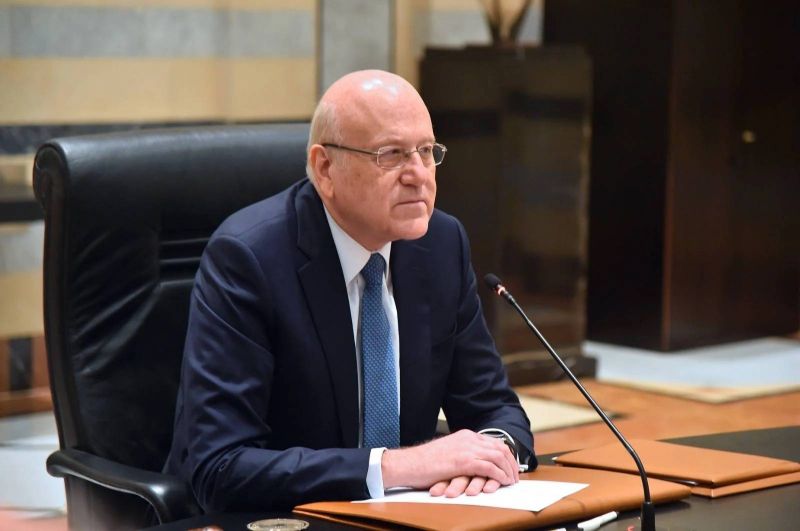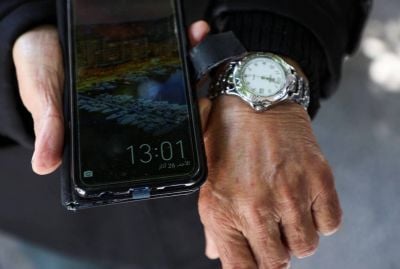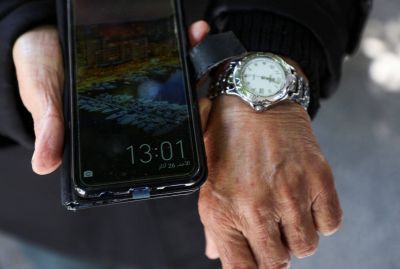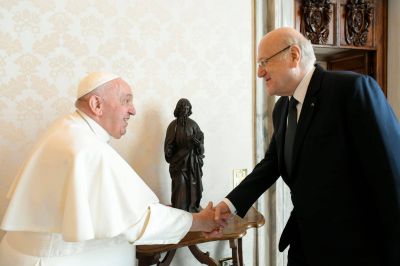
Caretaker Prime Minister Najib Mikati presides over a government session on Monday at the Serail. (Credit: Mikati's press office)
Caretaker Prime Minister Najib Mikati was forced to backtrack on Monday. After 48 hours of widespread chaos and mounting public outrage, the premier finally gave in to political pressure.
At a meeting Monday, Mikati’s cabinet made the decision to officially transition to daylight saving time on Wednesday night.
The controversy was sparked by Mikati’s almost unilateral decision to maintain winter time until the end of Ramadan on April 21, following a discussion with Parliament Speaker Nabih Berri.
However, Monday’s events revealed more than just the decision to switch to daylight saving time. Mikati opted for verbal escalation.
For the first time since the end of former President Michel Aoun’s term on Oct. 31, 2022, Mikati hinted at the possibility of stepping back from performing the tasks entailed in his role as caretaker premier.
“Every person has a limit to their endurance. Mine is beginning to be reached,” he said in a statement at the end of the cabinet session at the Grand Serail.
These words raise questions about what would happen were Mikati to step away from his role as caretaker prime minister in the midst of the country’s ongoing presidential vacuum. How would his role, limited as it is to managing the country’s day-to-day affairs, be performed?
Why did Mikati opt for this veiled threat? The question remains unanswered.
However, one possible interpretation of this approach is that it is a way to exert pressure on the country’s political actors to push forward the swift election of a new head of state.
Mikati reiterated on Monday that he, as prime minister, is not responsible for the presidential vacuum.
He pointed fingers at those blocking the presidential election, as well as the religious bodies involved in remarks that could be seen as a dig at both Amal and Hezbollah, the country’s Christian political parties, as well as Bkirki, the seat of the Maronite Church.
“I have endured in silence. But the time has come for all the protagonists to face their responsibility,” said Mikati, trying to shift the blame for the decision onto the cabinet as a whole. Mikati clearly did not want to bear sole responsibility for his decision, which was taken under pressure from Berri, who has so far been presented as the premier’s greatest supporter.
According to Ali Darwish, a former MP for Tripoli who is close to Mikati, the caretaker premier was surprised by the magnitude of the controversy around the daylight saving time postponement, and the apparent sectarian turn it quickly took. As a result, he decided on Saturday evening to cancel a cabinet session, which was scheduled for Monday to examine the issue of public servants salaries.
Wanting to avoid a confrontation with Berri, Mikati reportedly went as far as to threaten to step down.
In a statement to L’Orient-Le Jour, Fouad Siniora, a former premier, said that he and Tammam Salam, also a former prime minister, met with Mikati on Sunday evening to urge him to hold a cabinet session to face the problem.
“Mikati was serious about throwing in the towel because he was aware that the decision [to maintain winter time] was a mistake made under pressure from Berri [who had contacted the CEO of Middle East Airlines, Mohammad Hout, to ensure the feasibility of the move],” said a political source informed of the content of the discussions between the three Sunni leaders, on condition of anonymity given the sensitivity of the issue.
“Everyone knows that the decision to maintain winter time was a faux pas,” the same unnamed source said. “But behind Mikati, there’s Berri who made sure to leak the video of his meeting with the prime minister, in a bid to present himself as the de facto leader of a country without a Christian president.”
Contacts between the leader of the Progressive Socialist Party (PSP), Walid Joumblatt, and his longtime partner, Berri, as well as Mikati, helped to find a way out of the crisis.
According to Hadi Abul Hosn, a PSP MP from Baabda, the three “worked toward the holding of a cabinet session for the prime minister to backtrack on his decision.”
“Our efforts were initially hampered by [Free Patriotic Movement leader] Gebran Bassil’s diatribe against Berri and Mikati on Sunday, but we finally succeeded,” he added.
Mikati’s decision reversal was also made possible due to Joumblatt’s mediation with caretaker Education Minister Abbas Halabi, who is close to the PSP leader. On Sunday evening, Halabi offered schools the option of using either summer or winter time, backing down from an earlier decision compelling schools to follow daylight saving time.
‘As God is my witness, I did everything I could’
As a result of these concerted efforts, “the cabinet met in a calm atmosphere, where all ministers discussed the shift in the time zone,” according to a ministerial source who spoke to L’Orient-Le Jour on condition of anonymity.
“During the meeting, Mikati owned up to his mistake, admitting that he should have coordinated with his team,” the source added.
However, during his subsequent statements to the media on the sidelines of the cabinet meeting, Mikati expressed his dissatisfaction with being unfairly blamed for a shared decision.
“The decision to postpone the shift to daylight saving time until the end of the month of Ramadan was the outcome of several meetings that had taken place in recent months, where both ministers and relevant parties participated,” Mikati told the media.
“The decision to delay the shift to the summer time was taken to ensure a rest to people who fast during Ramadan, without any intention to harm other Lebanese components, knowing that this measure had already been adopted in the past,” he added.
Mikati was referring to a similar step taken in 1989 by Free Patriotic Movement founder and former President Michel Aoun who at the time was head of the transitional government.
A government source assured L’Orient-Le Jour that Mikati will, for now, continue to exercise his functions and plans to hold a cabinet session to discuss civil servants’ salaries in the near future.
This article was originally published in French in L'Orient-Le Jour. Translation by Sahar Ghoussoub.


